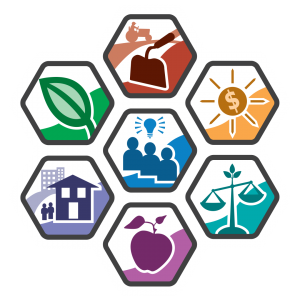Through the Global Resource Systems program, students like myself are given the opportunity to build a self-directed study around an international learning experience. The purpose of doing this is to help us structure our travels, delve deeper into the new environments we arrive in, and come away with greater insight into ourselves and the world around us. Travelling in itself is a test of independence, responsibility, and resourcefulness, but through outlining one’s interests and goals, it really helps to bridge the gap between passive tourism and active observation.
Goals:
Ultimately, the goal of my self-directed study is to explore some of Europe’s greatest capitals and to learn a bit more about what “good urban living” could mean. I will investigate the planning and design of the cities I visit, study their food systems and interactions with the surrounding ecosystem and rural economy, and try to get a sense of how happy their citizens are and what could be improved. I hope to bring these ideas back with me throughout the rest of my degree – perhaps drawing inspiration for how I can make Vancouver a better place with my City Studio project, and later in my career as an Urban Planner.
Learning Objectives:
- Develop practical skills in qualitative research and
 documentation, including conducting interviews, observing urban activities, and analyzing visual and textual data sources such as journal studies, photos, videos, and news articles.
documentation, including conducting interviews, observing urban activities, and analyzing visual and textual data sources such as journal studies, photos, videos, and news articles. - Gain an understanding of the role that urban planning and urban food systems play in several European cities, with a focus on similarities and differences across the cities in question, as well as in comparison to Vancouver, BC.
- Learn to effectively communicate my research and observations to a public audience through an online blog, a documentary video, and an artistic journal.
Methods:
- Reviewing literature on the history, planning,
 cultural, and political processes that have shaped the layout and design of the city.
cultural, and political processes that have shaped the layout and design of the city. - Observing, filming, and sketching urban activities in public spaces, markets, streets, and squares.
- Visiting urban farms and urban food markets and interviewing producers and consumers.
- Speaking with local experts, planners, and civilians about urban issues and identifying trends through recorded conversations.
- Synthesizing observations and data collection through film, photography, blogging, and artistic representation.
Questions:
Urban Planning & Design:
- How does the layout of the city as a whole
 reflect it’s history and the processes that shaped it? How are these elements reflected or juxtaposed by the design of buildings, streets, and civic centers on a smaller scale?
reflect it’s history and the processes that shaped it? How are these elements reflected or juxtaposed by the design of buildings, streets, and civic centers on a smaller scale? - What processes are currently shaping/reshaping the city and where are these influences coming from?
- Where does “community” thrive in the city, and who does it include/exclude?
- Where are the major gathering spaces in the city and what elements make them so? What might they have in common?
Agriculture, Food, & Environment:
- How/where do city dwellers get their
 food? Is it at markets, superstores, green grocers, etc.?
food? Is it at markets, superstores, green grocers, etc.? - What is the function of the public market for farmers, city dwellers, and the city as a whole? How does this differ from farmer’s markets in Canada?
- What challenges do farmers face in growing and selling food?
- What are the public perceptions of farming? What is the state of agriculture in terms of people moving to or away from farms?
- What kind of internal/external influences have shaped the city’s food system?
- What is the state of urban agriculture? Does it exist, and if so, what has allowed it to thrive? If not, what has prevented it from thriving?
- What is the city doing right or wrong to decrease environmental impact?
Deliverables:
- A fun-to-read and well-organized blog site
 that thoroughly documents my observations and reflections on a day-to-day basis.
that thoroughly documents my observations and reflections on a day-to-day basis. - A short documentary summarizing the highlights of my travels and learning.
- An artistic journal that captures the in-the-moment observations I come across as I travel.
- A set of recorded interviews with city locals and other stakeholders.
